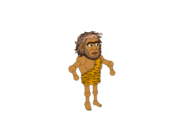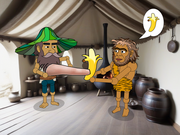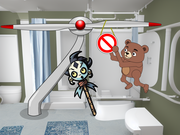person; people / CL:個|个[ge4],位[wei4]
to seem / like / as / if
若
=
艹
+
右
:
Mnemonic symbol: a wooden chicken as in 呆若木鸡, "dumb as a wooden chicken".
A nazi wants to beat up a wooden chicken in the observatory's bathroom for being different, but just as he charges across a sheet of artificial lawn Rachel Rhinoceros pulls she sheet from under his feet and lets him topple head-first to the ground. She thinks that the nazi is truly as dumb as a wooden chicken.
A nazi wants to beat up a wooden chicken in the observatory's bathroom for being different, but just as he charges across a sheet of artificial lawn Rachel Rhinoceros pulls she sheet from under his feet and lets him topple head-first to the ground. She thinks that the nazi is truly as dumb as a wooden chicken.
to eat / to consume / to eat at (a cafeteria etc) / to eradicate / to destroy / to absorb / to suffer / to stammer (Taiwan pr. for this sense is [ji2])
(completed action marker) / (modal particle indicating change of state, situation now) / (modal particle intensifying preceding clause)
to finish / to achieve / variant of 瞭|了[liao3] / to understand clearly
了
=
乛
+
亅
:
Mnemonic symbol from "to finish" and the shape of the character: a prize cup.
Li Qingzhao (li) is responsible for manufacturing a prize cup (了). She only needs to add a poetic engraving. Unfortunately, she suffers from a writer's block. In the aorta's living room (ao3), someone left a cryptic message engraved on the walls using a sickle (乛), which is still lying on the floor. Being an accomplished poet Li Qingzhao is able to understand the message clearly (了), realizes its poetic potential and starts to engrave it on the prize cup using a crowbar (亅).
Li Qingzhao (li) is responsible for manufacturing a prize cup (了). She only needs to add a poetic engraving. Unfortunately, she suffers from a writer's block. In the aorta's living room (ao3), someone left a cryptic message engraved on the walls using a sickle (乛), which is still lying on the floor. Being an accomplished poet Li Qingzhao is able to understand the message clearly (了), realizes its poetic potential and starts to engrave it on the prize cup using a crowbar (亅).
can / may / able to / to approve / to permit / to suit / (particle used for emphasis) certainly / very
可
=
丁
+
口
:
Alternative mnemonic symbol: kebab, from the pronunciation "ke". Karl Marx (k) is preparing a kebab (mnemonic symbol for 可) in the elevator's living room (e3). He also skewers mandarins (口) on the long steel nails (丁) and will only allow (可) his guests to eat the rest of the kebab if they eat their mandarins first.
old variant of 以[yi3]
㠯
=
尸
+
口
:
Mnemonic symbol: 㠯 looks like a cool pair of safety goggles.
A ghost (尸) has been hiding from Maud Younger (Ø3) in a mandarin (口). Maud finds the mandarin in the space station's living room (Ø3) and squeezes the ghost out, and in order to (㠯) be protected from the mandarin juice flying all around in zero gravity she is wearing safety goggles (㠯).
A ghost (尸) has been hiding from Maud Younger (Ø3) in a mandarin (口). Maud finds the mandarin in the space station's living room (Ø3) and squeezes the ghost out, and in order to (㠯) be protected from the mandarin juice flying all around in zero gravity she is wearing safety goggles (㠯).
to use / by means of / according to / in order to / because of / at (a certain date or place)
length / long / forever / always / constantly
chief / head / elder / to grow / to develop / to increase / to enhance
长
=
乛
+
丆
+
丿
:
The chief (长) is asking James II of England (zh) for help, because his wind wheel (丆) in the anglepod's living room (丆) isn't performing very well. After finding out that there's too much friction, James II of England uses a sickle (乛) to cut open a banana (丿) and uses the pulp to grease the wind wheel and enhance (长) its performance.
prefix used before the surname of a person or a numeral indicating the order of birth of the children in a family or to indicate affection or familiarity / old (of people) / venerable (person) / experienced / of long standing / always / all the time / of the past / very / outdated / (of meat etc) tough






